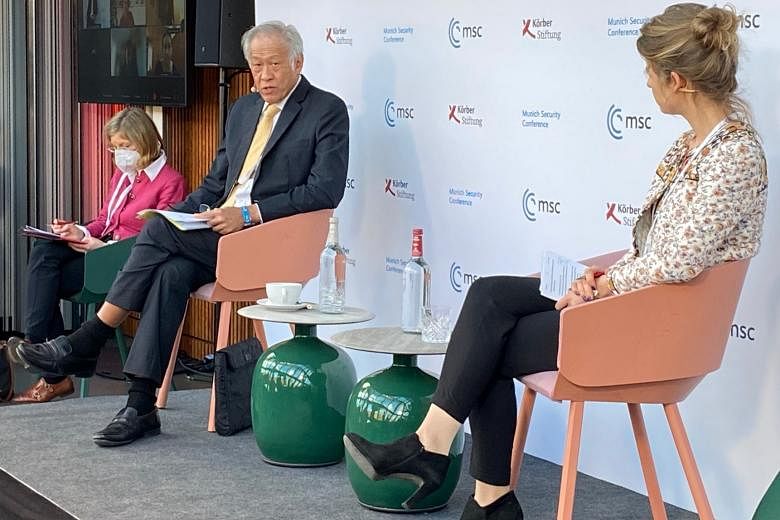SINGAPORE - The crisis over Ukraine is a manifestation of a larger geopolitical contestation, said Singapore’s Defence Minister Ng Eng Hen in Munich on Saturday (Feb 19).
He called the volatile situation the greatest security crisis of Europe since the Cold War.
“This incident in Ukraine reaffirms an old African dictum – and the African saying is this: ‘When elephants fight, the grass suffers’,” said Dr Ng during his speech at the 13th Munich Young Leaders Roundtable (MYL Roundtable) on Charting A More Equitable Post-pandemic Future.
The Defence Minister is currently in Germany to attend the three-day Munich Security Conference (MSC) which ends on Sunday.
Fears of an imminent Russian invasion of Ukraine have reached fever pitch after months of Moscow trading barbs with the North Atlantic Treaty Organisation (Nato) and the United States. An estimated 150,000 Russian troops have moved near the borders with Ukraine.
In his speech, Dr Ng also touched on other pan-geographic forces as “elephants”, saying that he was referring to groups rather than issues.
He said: “Different groups can be on opposite sides even if they are focused on the same issue. And who are these? Well, we have cancel culture activists, green groups and climate change activists, LGBTQ+ communities and their advocates, religious conservatives, hard-line nationalists, anti-federalist groups.”
“They are actually non-state entities but they can galvanise forces. And these groups have vastly different views on what the regional and international order should look like and how to achieve their ideals,” he added.
He observed that post-World War II mechanisms that remain today like the United Nations (UN), the World Trade Organisation (WTO) and the World Health Organisation (WHO) are under siege.
“What’s happened post-World War II now, 70 to 80 years now, we see new institutions driven by different principal actors to bring coordinated action where older institutional frameworks in their mind, couldn’t fix, couldn’t get a consensus, so that they can address these pan-geographic issues,” said Dr Ng.
The Group of 20 (G-20), Asia-Pacific Economic Cooperation (Apec), Comprehensive and Progressive Agreement for Trans-Pacific Partnership (CPTPP), Australia-UK-US Trilateral Security Pact (Aukus) and Quadrilateral Security Dialogue (Quad) are examples such new institutions.
“The challenge I have for you is, I think you have to invest in the institution that you believe in. You have to build them up, recognise that leadership is essential,” said Dr Ng.
“You need to raise leaders who believe in what they’re doing, just as we can talk post-World War II institutions, whether it’s UN, WTO, WHO – they are not perfect, but you have to build institutions.
“And that is why we are investing in this time to speak to one another, and ultimately it is about what you believe, what you believe can change, what you believe can be in effect, and who you do it for.”
The MSC is an annual high-level security conference that brings together heads of government, defence and foreign ministers, parliamentarians, military leaders, and security experts from around the world.
This year’s MSC covers a wide range of important security issues. These include geopolitical and security developments in Europe, Asia, Africa and the Middle East, and other security issues pertaining to defence cooperation, international trade and climate security.
The MYL Roundtable, held on the sidelines of the 58th MSC, brings together young leaders from governments, think-tanks and the private sector from the Asia-Pacific, Europe, the Middle East, and the United States to discuss issues related to foreign and security policy.
Dr Ng will also be speaking on the topic “Bridging Troubled Waters – Rethinking Maritime Security Cooperation in the Indo-Pacific Region”, as part of a Maritime Security Roundtable at the MSC.
This story has been edited with updates from the 13th Munich Young Leaders Roundtable.

